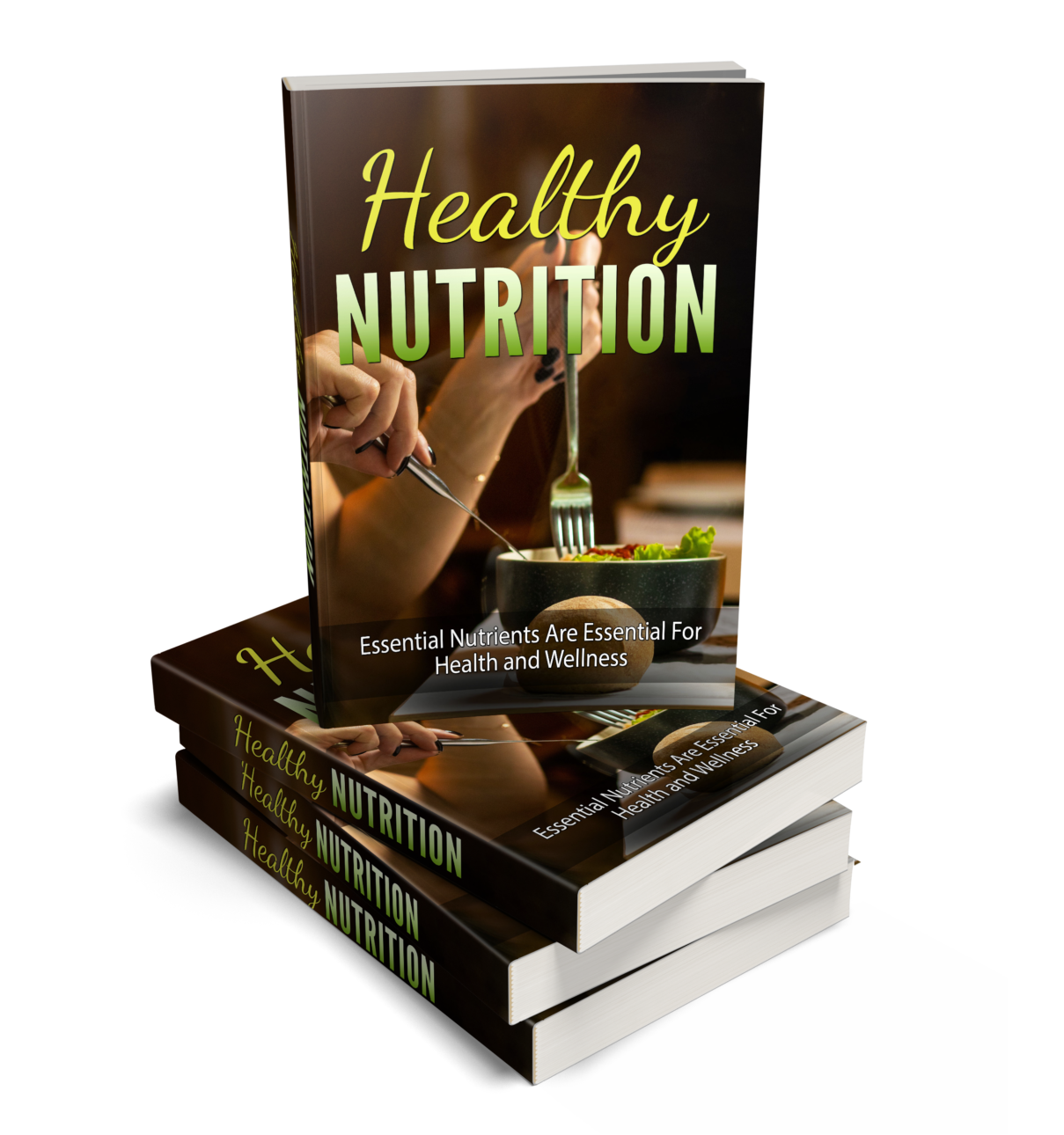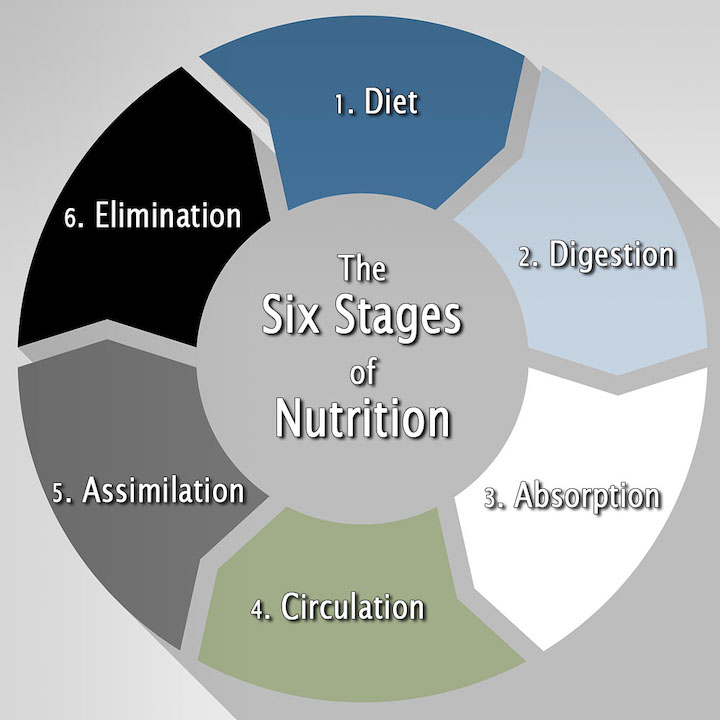Eating healthy is more than just eating fruits and vegetables and putting as many colors of the rainbow as possible into our diet.
When we say a person eats healthy, it’s more than just maintaining a nutritious diet.
There is more to nutrition than just eating fruits and vegetables. To eat a nutritious diet and have the foods we eat most benefit our health, it helps to understand that nutrition goes through a multi-stage process.
For us to be able to fully benefit from the food we eat means that the nutritional building blocks that make up our diet should be distributed throughout our system, then absorbed by the cells for optimal functioning, and ultimately eliminated from the body in the form of waste after it has been metabolized.
Therefore, the concept of nutrition is more than just maintaining a healthy diet. What we eat is only the first stage in a six-stage process.
The Six Stages of Nutrition
Diet
Our diet is composed of all the food, drinks, and nutritional supplements we take daily and consume regularly. Having the intention of becoming healthier still begins at the dietary level, even though it is only the first stage of nutrition.
To get the nutrition you need from your diet, you have to begin by eating food and drinking liquids that are highly nutritious and you need a variety of healthy foods.
Unfortunately, many of our foods contain or are exposed to elements that are adverse to our health, such as toxins, pesticides and other chemicals, food additives and preservatives.
Out of the six stages, this dietary stage is the one that we have the most control over. This is why it is important we make good choices at this level. Our diet is the foundation for healthy nutrition and for better or worse, impacts all the other five stages.
Digestion
Digestion begins in the mouth when we bite, chew, and swallow food. These actions are voluntary and something we can still control. However, once the food is swallowed, the whole digestion process becomes involuntary, and ultimately controlled by the nerves.
During digestion, the food we eat gets broken down and converted to simpler substances for it to be used as energy for our cells, organs, and tissues. Protein is broken down as amino acids, fats into fatty acids, and carbohydrates into simple sugar like fructose or glucose (blood sugar).
Absorption
From the food we eat, we derive macronutrients in the form of protein, fats, or carbohydrates. These highly complex substances get broken down into simpler substances during the digestion phase.
In the absorption phase, the by-products of digestion (amino acids, fatty acids, and glucose/fructose) pass through the intestinal lining and head toward the circulatory system.
Most nutrients get absorbed into the bloodstream, whereas lipids and lipid-soluble nutrients are absorbed through the lymphatic system.
Circulation
The main role of the circulatory system is to transport the nutrients the body has absorbed from the broken-down substances derived from the food we eat to the cells.
They do this constantly to power up the cells with nourishment and to enable cells to convert nutrients into energy. This makes carrying out our bodily functions possible.
Think of the circulatory system as the body’s main transit system that enables traffic to flow smoothly. We wouldn’t want it to ever go on a mass strike preventing the main goal of nutrition, and the conversion of food into nutrients and energy.
Assimilation
We consider our cells to be the building blocks of life, providing the structural framework for our body to carry out its proper functions. However, cells aren’t immune to wear and tear. They also have to grow and repair themselves.
For cellular repair to happen, proper assimilation of nutrients from our diet is critical and the cell membranes need to be healthy. During the assimilation process, nutrients from the bloodstream pass through the cell membranes, where the cell assimilates vitamins, minerals, and other chemical substances delivered from our digestion within the GI tract.
When nutrients are properly assimilated in the membranes, cellular renewal and repair happen. A few symptoms of malabsorption include fatigue, irritability, depression, lethargy or loss of energy, muscle weakness, and weight loss.
Elimination
This sixth and final stage of nutrition involves the efficient elimination of toxic wastes from the body. Whatever goes into the body creates some form of waste product that needs to come out in one form or another.
The process of elimination or excretion is primarily experienced by us through bowel movement, the urinary process, sweating, and breathing. However, elimination is more than that.
It begins at the cellular level and gets completed through metabolically-active zones in the body which are the lungs, colon, skin, and kidneys.
The last stage of nutrition is elimination and wastes must be eliminated regularly from the body, otherwise, they can create autointoxication and easily cause illness. We all know what it is like to not be able to eliminate toxins easily. It makes you feel very unwell!
Special Offer!
You Will Find This Course In You Earth Plus
Coming Soon
Your Diet and Nutrition Is Important For Your Health, Vitality and Longevity!

You Can’t Be Healthy If You Don’t Eat Healthy Food
Life can be stressful and busy, which is often the excuse we have for a bad diet. Understanding the role that nutrients play in our food can make it easier for us to become more mindful and selective of what we eat.
Healthy Nutrition
This eBook can help you do exactly that!
Food is a constant presence in our lives. It is available to us everywhere, but among the potential drawbacks of this are the choices we make. We often decide what we want to eat based on how the food tastes, how sumptuous it looks, or how hungry we are.
That isn’t all bad unless we develop bad eating habits that contribute to the development of disease in the body.
So one of the essential components of healthy living is eating right.
Eating right is incredibly important, but it may also take more effort to eat healthier. This may mean you have to plan your meals, prepare your food (which typically takes time), and most importantly, understand the impact of different nutrients in your foods, and how they affect the body.
This eBook will help you understand the importance of good nutrition, for your health, vitality, and longevity.
You will discover what your body needs, and even more importantly, what it doesn’t need and shouldn’t have!
You will learn –
- The 6 Stages of Nutrition for optimal health.
- Nutrition tips to follow for a longer, healthier, more active life
- What macronutrients and micronutrients are, and why this understanding is vital to healthy nutrition.
- What causes food cravings, and if your cravings are a sign of a nutritional deficiency.
- Essential vitamins and minerals for men and women.
- Essential nutrients to include in a vegetarian diet.
- The dangers of processed foods, which ones to especially avoid, and why.
- Why you need to consume less sugar and salt, and how to do it.
- And much, much more!



